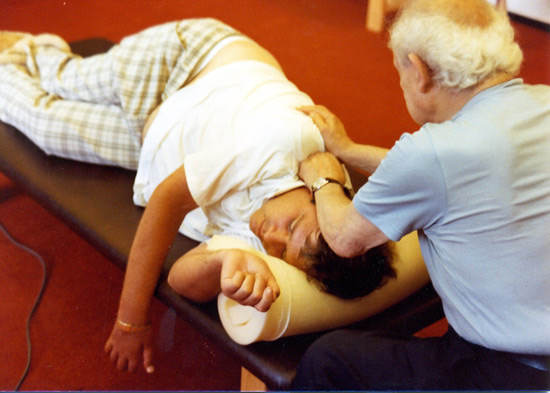Feldenkrais can change your life. Some people “get it” straight away, and those people often go on to become my colleagues. Others come along to classes and workshops regularly and have the odd hands-on lesson every few months, but never quite make the shift into the self-generated self-development the Method was designed for. Of course there are many reasons for this; modern life is busy, most of us already have an awful lot to do, and it isn’t so easy to make time for more of something, even when we know that something is making our life better.
Stories of miraculous “breakthroughs” are more exciting, and appealing to the media, plus they hold out the hope for an easy solution to our problems. Real change of the sort that permanently improves our well-being usually requires regular–often daily–practice, and so, without the immersive experience of a professional training, many people are only skimming the surface of what Feldenkrais could do for them.
Added to that our potential for continuing self-development is poorly understood; our culture is riddled with out-of-date ideas about human capabilities, constantly pushing the “nature” side of the story at the expense of the more empowering “nurture” side of the equation. As soon as I began to understand how much we are shaped by our experiences from birth it became obvious that genes were not always the determining factor that they are often portrayed as being, despite the popularity of reductionist concepts such as the “selfish” gene. Gene research attracts a lot of funding–it is not so easy to monetise the adaptive, responsive and life-long-learning abilities of our human brain and nervous system. Our current model of healthcare treats us like machines in need of fixing, rather than self-healing bio-systems, fully capable of bringing ourselves back into a state of healthy equilibrium. By focussing on suppressing symptoms, rather than recognising and respecting them as signs that we need to modify some aspect of our behaviour in order to return to a healthier state, we have developed a pharmacologically-dependent culture and embraced a kind of “learned helplessness“. Such is the level of disconnect in society it is not unusual for a person to campaign for more funding to fight the “war” against cancer, while continuing to eat copious amounts of sugar, and smoke cigarettes.
No wonder we are struggling to heal our planet when our ideas about how healing happens are based on such limited and inaccurate reductionist models. We live in a world where the wealthy fantasise about extending their lives by replacing a brain and nervous system at the pinnacle of evolution with mechanical bodies–bodies they imagine will be an improvement on the self-maintaining and healing structure they were born with– and into which they believe they will be able to download their individual consciousness, despite it being very clear that neuroscience still has absolutely no explanation for what consciousness is, or how we come to have so much of it.
My own health improved during my very first experience of an Awareness Through Movement workshop, but I didn’t know why. Even after four years of training and 29 years of teaching my understanding of this deeply human “art” continues to grow, pretty much on a daily basis.
One thing has become clear; if my more casual students are to get more of the potential benefits of “learning to learn” then clarifying what constitutes a daily Feldenkrais practice is crucial. No one imagines they will become a Judo or Tai Chi master with a weekly class and an occasional 30 minutes practice at home. No one who considers themselves to be “doing” yoga or Aikido thinks an hour a week is enough to reap the potential benefits of these wonderful systems. The Feldenkrais Method suffers from the very size of its founder’s ambition. It is clear to me that Moshe Feldenkrais was designing an updated form of Judo––Judo 2.0––an intentionally non-martial human development art, something suitable for a peaceful, modern, diverse urban culture; a selection of skills easily adaptable to the 21st Century and beyond; a training manual for maturing and fine-tuning the human nervous system, so that any one of us, of any age, could become capable of upgrading ourselves whenever and however necessary, so as to be ready––and eager––for any new experience that comes our way.
Feldenkrais intended his Method as a meta-process. He believed that he could refine the most effective elements of learning how to learn, so that his students would be able master anything that they set out to; not just physical skills, but mental abilities as well––ultimately his aim was that a person who studied his method would be free to choose any life path that called to them. He talked about returning us to our “full human dignity”, and helping us achieve both our “avowed and un-avowed” dreams. It frustrates me a little that when you read much of what is written about the Method you might actually think that the goal is merely being able to move with more ease–Moshe would bellow at his trainee teachers:
“It’s not about rolling, any idiot can roll!”.
My goal as a teacher is to find as many ways as possible to make it easier for you all to do some Feldenkrais every day. I am setting up online classes and courses to expand the possible ways you can study with me, and I am already teaching one-to-one sessions online. I know from experience that it is possible to use this distillation of learning strategies to keep coming up with new ways to make life a little better one day at a time. Some of these strategies are particularly suited to daily practice and I am steadily organising them into a format that will work in a similar way to a Tai Chi or Qi Gong form so that it will be easier to do a little Feldenkrais everyday, and find your own path to your avowed and unavowed dreams.
